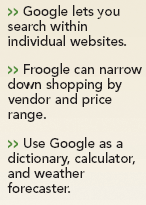Article
Save time with smarter Googling
Tech Talk

And when internist Alberto Borges in Arlington, VA, wants to give a patient directions to a consultant's office, he types the address in the same box, clicks his mouse, and produces a map.
The little box is called the Google search engine (found at http://www.google.com), and like a digital know-it-all, it can help a doctor in a myriad of ways, such as: Shop for a printer between $500 and $1,000. Look up the weather in the city he's flying to tomorrow. Define a technical term. Calculate 43 percent of 3,456.
We'll review some basics about making Google searches short and sweet as well as brainy features of this technology that you may not know about.
Google "operators" sharpen searches
A few well chosen words let you do quick and dirty research. Entering tort and reform, for example, begins a crash course on this hot-button subject (from this point in the article, all search terms appear in boldface). Add California and you'll zero in on developments in the Golden State. In this example, you needn't add and-Google assumes you want web pages containing every term.
To make searches more precise, try out these tricks:
Put quotation marks around search terms to find strict matches. You'll grasp the benefit of quotation marks-an example of a so-called Google search operator-when you enter the phrase Family Medical Center with and without this punctuation. Omitting quotation marks will yield web pages that contain all three words, but not necessarily the exact phrase.
Want to buy a computer mouse? You'll screen out web pages about the furry creatures inside your walls if you type mouse–animal. The hyphen, or minus sign, before animal is a Google operator that excludes a search term's dual meaning.
Maybe you'd like to shop for an iPod between $200 and $300. If so, enter iPod followed by $200..$300, a numerical range operator. Those parameters will help you find the prices you want.
One Google operator-a tilde-broadens rather than narrows a search by including the synonyms of a term. Type in ~PDA, which means "personal digital assistant," and you'll lasso web pages with titles containing "Palm" and "handheld computer."





